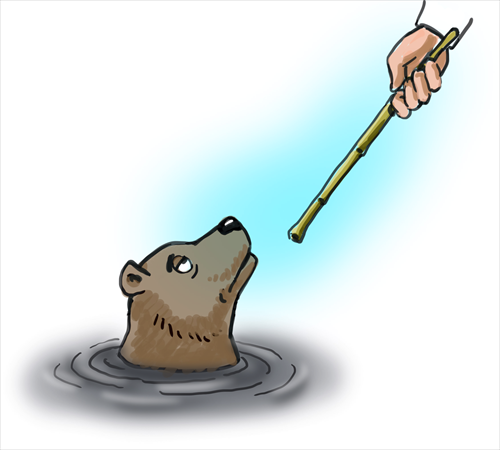China can do little to put out the Kremlin’s economic fires

Illustration: Liu Rui/GT
There has been much debate on whether China should offer help to Russia, which has been beset by economic difficulties. I think China is unable to put out a fire thousands of kilometers away. Besides, Russia hasn't sought help from others so far as it is unwilling to receive aid or accept any results unfavorable for its interests.
Statistics released by the Russian government tell the story. Russia's losses from sanctions and declining oil prices reached $130-140 billion and will continue in 2015. Capital flight was $125 billion and is expected to be another $90 billion in 2015.
The appreciation of the dollar pushed up the purchase price and hence food prices. And the fresh provision of military equipment has taken up a considerable portion of budgetary funds.
All this has resulted in the ruble's plunge, high inflation rate and shaky financial institutions. The economic tumult that has struck the whole country requires massive efforts to tackle.
Russian public opinion holds that the economic tumult has largely been caused by three things. First, the drastic fall of oil prices from $100 per barrel to around $60. Second, for decades, the Russian economy has been dependent on oil, natural gas and other related resources, without measures for modernization and high-tech development. Third, the economic sanctions imposed by the US and EU on Russia due to the Ukraine crisis and the countermeasures taken by the Kremlin.
Is China capable of helping Russia to deal with such deep turbulence in economic, societal, political and even military sectors? In history there has never been a case where a country is pulled out of economic tumult or crisis solely through the aid of others.
Are we able to inflate the oil price to a level that suits Russia's interests? Even if this could be done, will that price be acceptable for China? Can China invest heavily in Russia now or work to make the ruble not depreciate and inflation not rise any more?
It's noteworthy that when delivering his annual state of the nation address, Russian President Vladimir Putin attributed the current economic turbulence to the Ukraine crisis, and hence countering the sanctions demonstrated Russia's interests, sovereignty and strength. He argued it was manipulation by speculators that resulted in the slide of ruble.
All in all, Putin believed that the turbulence would be addressed once the sanctions were lifted, speculation eliminated and the results of the seizure of Crimea maintained.
Some observers consider the comprehensive strategic partnership between China and Russia as the Kremlin's only option for aid, but the Kremlin didn't seem to think this way. Putin's policy shift toward the East has a wide coverage, which includes the Eurasian Union in addition to China. Besides, Russia's strategic partnerships with India and Vietnam are also significant. On December 11 Moscow and New Delhi signed a 15-year document on nuclear energy cooperation.
If we take the Sino-Russian partnership as Moscow's only available option while it is actually one of many, can China be of help with massive imports of oil and natural gas from Russia? It won't satiate Russia since oil prices sit at such a low level.
Should China work with Russia to counter sanctions or punish those speculators that disturbed the Russian economy? What benefits can we obtain from this and will Russia reciprocate?
As Putin emphasized that Russian interests must be defended, China should also keep in mind its own national interests.
The author is a research fellow with the Institute of World History at the Chinese Academy of Social Sciences. opinion@globaltimes.com.cn